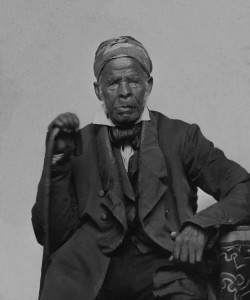African American History: Omar ibn Said
February 13, 2019
Last week, in celebration of African American History Month, the African and Middle Eastern Division at the Library of Congress (LOC) in Washington, D.C., hosted an event called “Conversation on the Omar ibn Said Collection.” Omar ibn Said was a western African scholar who was captured and sold into slavery in the United States in the early 1800′s. Noted for his education and intelligence, Said—a Muslim who spoke Arabic—gained notoriety during his lifetime and wrote an autobiography in 1831.

Omar ibn Said in North Carolina in 1850. Credit: Yale University Beinecke Library (licensed under CC BY 2.0)
Autobiography of Omar ibn Said, Slave in North Carolina is the only known memoir written in Arabic by a slave in the United States. The LOC’s Omar Ibn Said Collection includes the original manuscript of his autobiography, as well as texts written in Arabic by western African slaves held in countries other than the United States. The conversation on Said’s autobiography included an examination of Muslim communities in Africa and the people who continued to practice Islam after being forced into slavery.
Omar ibn Said was born around 1770 in what is now Senegal. After years of schooling in Africa, he was enslaved and taken by ship to Charleston, South Carolina. Shortly after Said’s arrival in the United States, he escaped but was captured in North Carolina and briefly imprisoned. During his 16-day detainment, Said wrote in Arabic on the prison walls. His writing caught the attention of wealthy farmer James Owen, who purchased Said and apparently encouraged his literary efforts. Said then wrote his autobiography and many works related to the Qur’ān, the sacred book of the Muslims. Although highly critical of Christians who supported and participated in slavery, Said converted to Christianity during his captivity. He died in North Carolina in 1864. An English-language version of Said’s memoir was first published in 1925.



